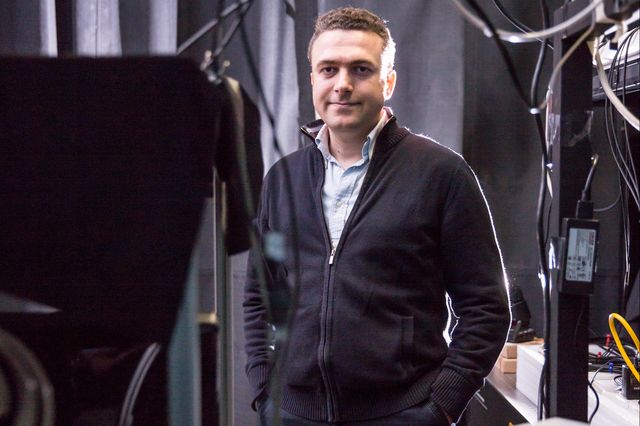Researchers at the UCLA Henry Samueli School of Engineering and Applied Science and California NanoSystems Institute (CNSI) have won a $1 million, three-year grant from the National Science Foundation for on-site and ubiquitous quantification and automated characterization of nanoparticles found in homes, workplaces and the environment.
 Professor Aydogan Ozcan. Credit: Joanne Leung
Professor Aydogan Ozcan. Credit: Joanne Leung
Nanoparticles — bits of metals or other materials that are far tinier than individual blood cells — are increasingly being used in personal care products, cleaning supplies and other items because they have properties that improve the products’ performance or longevity. But the health and environmental impacts of nanoparticles are poorly understood.
Led by Aydogan Ozcan, Chancellor’s Professor of Electrical Engineering and Bioengineering, UCLA researchers will use lightweight, portable and cost-effective imaging devices that can quantify and characterize nano-size objects without relying on bulky and expensive lab equipment.
The research will build upon the sophisticated and inexpensive imaging devices Ozcan’s lab has been developing for a variety of medical, scientific and other metrology applications, including cellphone attachments capable of detecting disease biomarkers in bodily fluids, allergens in small food samples, and the presence of disease or malnourishment in field crops.
The grant is one of 10 announced Sept. 14 by the NSF to develop and integrate “smart” technologies into energy, transportation and other systems that have major impacts on environmental and public health.
“More and more, nanoparticles are being used in commercial products and industrial processes, even though their implications for health and environmental safety still are being debated,” said Ozcan, who also is an associate director of CNSI. “Developing a sensitive and yet field-portable, inexpensive method to detect the presence, spatio-temporal distribution and concentration of nanoparticles in air and water — whether at home, at work or in public spaces — is a high priority at a global scale.”
Ozcan’s team will use computational imaging systems based on complementary metal-oxide semiconductor sensor chips and other microscopy platforms developed for mobile phones.
Mihaela van der Schaar, a Chancellor’s Professor of Electrical Engineering at UCLA, is also a co-investigator on the research.